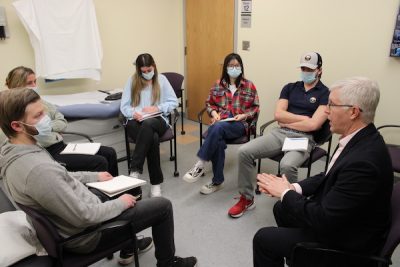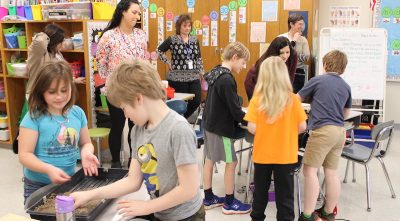The Center for Experiential Pedagogy and Practice (CEPP) advances experiential teaching, learning, and professional development for educators, counselors, school leaders, and others by engaging faculty and students in basic and applied research and design initiatives across Syracuse University and beyond. Our work rests on one foundational principle: immersive experiences advance learners’ preparation for complex professions.
The Center engages in work across the School of Education and Syracuse University, including teacher preparation, counselor education, and professional development.
 Live and recorded interactions that approximate a challenging professional interaction, such as between an educator (either current or student) and a trained actor portraying a standardized individual. Clinical simulations are an opportunity to practice synthesizing what you know into what you can do for uncommon, but often high-stakes, situations.
Live and recorded interactions that approximate a challenging professional interaction, such as between an educator (either current or student) and a trained actor portraying a standardized individual. Clinical simulations are an opportunity to practice synthesizing what you know into what you can do for uncommon, but often high-stakes, situations.
Current projects include:

A collaborative process for planning, analyzing, and continuously improving instructional practices through live observation, evaluation of student learning and ideas, and setting goals for further inquiry.
The Lesson Study method is derived from the established Japanese continuous improvement model of jugyou kenkyuu. SOE research is funded by the National Science Foundation.
By encouraging teachers to carefully observe student learning as it happens, collective learning about standards, student thinking, curriculum materials, and instructional practices is promoted. Current learning modules used for Lesson Study in local Syracuse-area schools focus on science, math, and literacy.
Robust SOE/local school district Mediated Field Experience partnerships combine K-12 student enrichment, teacher education for pre-service candidates, and professional development. For pre-service teachers, interactional clinical experiences provide opportunities, structure, and support when applying teaching knowledge to the realities of classroom instruction.
Without mediation, pre-service teachers might apply their textbook knowledge problematically or not make sense of teaching practice that produces unexpected results. Thus, mediators can modify their focus according to what happened during their observations of teacher candidates.
Digital counseling/tele-counseling is part of a collaboration among the School of Education’s counseling programs, Falk College’s School of Social Work, College of Arts and Sciences’ Department of Psychology, and SUNY Upstate Medical University’s Psychiatry Faculty Practice.
This collaboration—funded by a grant from the US Department of Health and Human Services Health Resources and Services Administration—Integrates behavioral health care with immersive/digital components; improves the availability and quality of mental health services for children, adolescents, and families; and addresses the critically high need for more child and adolescent mental health providers in CNY.








